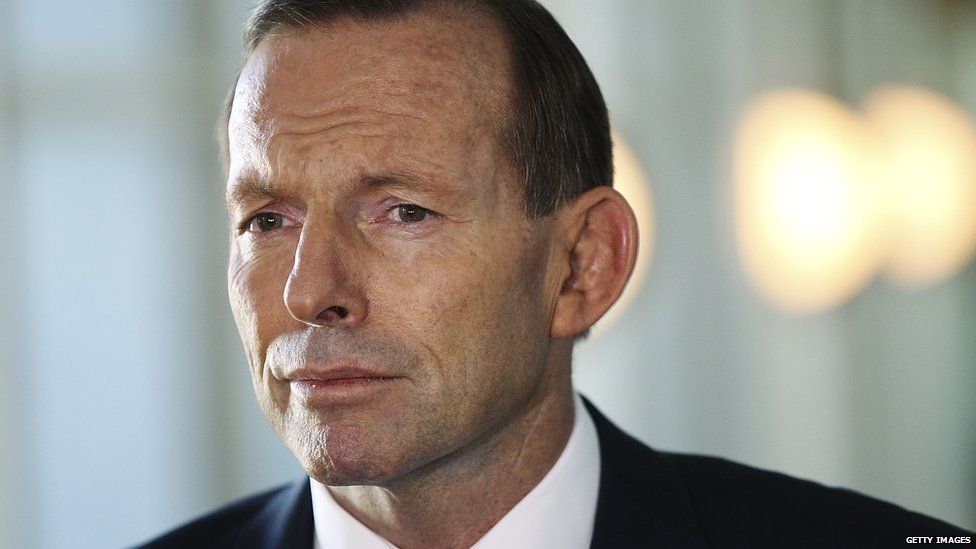How it all went wrong for Australian PM Tony Abbott
- Published

It is being described as "front stabbing" - a brutal attack on his leader by Malcolm Turnbull, who has long coveted the job of prime minister of Australia.
Rumours that cabinet and backbench government MPs were once again worried about Tony Abbott's performance had been circulating since late last week.
A leaked list of ministers Mr Abbott wanted to dump reportedly angered many in the cabinet. Then, on Monday, two public opinion polls conducted by Australia's two major media companies showed there was likely to be a sharp swing away from the government at a by-election in Western Australia due this Saturday.
When Communications Minister Mr Turnbull announced his intention to challenge Mr Abbott on Monday afternoon, he did not mince his words.
He told journalists if Mr Abbott remained in power, the Liberal-National Coalition would lose the general election, due mid-next year.
He said the prime minister had failed to provide economic leadership; had lost the confidence of the business sector; had failed to explain to the public the challenges and opportunities the nation faced; and had developed policy on the run.
Many in the coalition have warned against removing Mr Abbott and repeating the disastrous leadership debacle of the previous Labor government.
Deputy PM Julia Gillard toppled her leader Kevin Rudd, only to be toppled later by Mr Rudd, who was then punished by the public in the 2013 election.
So, how did it get to this for the Liberals?
The government started its first term two years ago on a strong note.
It delivered on an election promise to repeal Labor's levy on the country's biggest greenhouse gas emitters, dubbed the carbon tax. It also dumped a 30% tax on coal and iron ore mining profits.
Tough immigration policies, including turning boats carrying migrants back to Indonesia, stemmed the flow of asylum seekers.
The moves were popular with the public but Mr Abbott's regular mantra that he had "stopped the boats" and "axed the tax" eventually wore thin.
His inability to explain tough budget measures and his failure to get all of the budget savings through a hostile senate showed through in regular opinion polls.
Policy reversals
Unpopular policy measures included a plan to charge people an extra A$7 (US$5; £3.25) for every visit to their local doctor; a major cut to university funding; and a proposal to make young people wait some time before they could receive unemployment benefits.
Policy reversals also damaged Mr Abbott's credibility.
In February, he dropped one of his signature policies - a paid parental leave scheme - when it became clear that it would be difficult to fund and wasn't that popular with women voters who wanted child care subsidies instead.
Away from the economy, Mr Abbott appeared to be out-of-step with the public on issues such as gay marriage (many Australians want to see it legalised - Mr Abbott is firmly against it).
More recently, he misjudged the public's willingness to accept refugees from war-torn Syria, belatedly announcing Australia would take in 12,000 Syrians over the next year.
His personal loyalty to some of his MPs has also attracted public criticism and social media derision.
Former Speaker of the lower house, Bronwyn Bishop, faced fierce criticism for three weeks for spending more than A$5,000 chartering a helicopter from Melbourne to Geelong to attend a Liberal Party fundraiser.
Ms Bishop retained the prime minister's support until she finally resigned in August.
Political pundits have been reminding people that Tony Abbott was never particularly popular with the public, winning the 2013 election because voters were disgusted with Labor.
That was part of the reason for an unsuccessful push to topple him in February, this year.
He was saved by a decision of the majority of Liberal Party MPs not to open up Mr Abbott's position to challengers. In return, he promised his MPs he would turn things around.
After a series of hugely unpopular so-called captain's picks - most notoriously announcing a knighthood for Prince Philip in January - Mr Abbott promised to consult more with his colleagues.
His personal style has always been a source of discontent, both inside and outside his party.
As Opposition leader he was best known for his outspoken ways, perhaps best exemplified five months after a 2010 trip to visit Australian troops in Afghanistan, where media recorded him discussing the death of an Australian corporal.
"It's pretty obvious that, well, sometimes shit happens, doesn't it?" Mr Abbott said.
In government, his minders have kept him on a tight rein, sticking to a script that regularly mentions the government's achievements such as "stopping the boats".
But it is his alleged inability to convince the public that his agenda is the right one that Mr Turnbull targeted so mercilessly when he announced his challenge on Monday.
"We need advocacy, not slogans," said Mr Turnbull.
"We need to respect the intelligence of the Australian people."
- Published27 January 2015
- Published12 August 2015
- Published15 June 2015